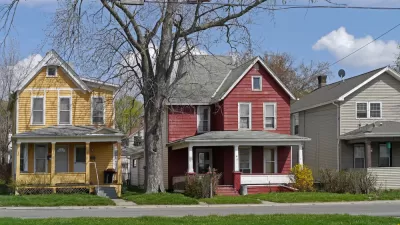The on-going foreclosure and subsequent credit crisis should offer important lessons for housing policy and public policy more broadly. Chief among these lessons might be the falsity of the notion that government regulation is always bad. But some conservative commentators cling to the dogma that government intervention is the root of all evil. An explanation being offered by some is that government intervention in the form of Community Reinvestment Act encouraged irresponsible lending and led to the subsequent housing bust.
The on-going foreclosure and subsequent credit crisis should
offer important lessons for housing policy and public policy more broadly. Chief
among these lessons might be the falsity of the notion that government regulation
is always bad. But some conservative
commentators cling to the dogma that government intervention is the root of all
evil. An explanation being offered by some is that government intervention in
the form of Community Reinvestment Act encouraged irresponsible lending and led
to the subsequent housing bust. Walter
Williams writes "These financial
problems are not market failures but government failure. The Community
Reinvestment Act of 1977 is a federal law that intimidated lenders into
offering credit throughout their entire market and discouraged them from
restricting their credit services to low-risk markets " On the face of it this makes no sense. If the
banks were so intimidated by CRA why did they wait nearly a quarter of a
century to go overboard and start making irresponsible loans? Furthermore, many of the most abusive
predatory lending was undertaken by weakly regulated mortgage brokers who had little
to fear from CRA. Thus, it is important
that the policies that encouraged affordable
homeownership not be gutted due to the excesses of the subprime frenzy.
Another lesson to be distilled from the on-going crisis is
the intellectual bankruptcy of fixating on the supply side to resolve our
economic/financial problems. As of this
writing congress is considering a program that would bailout financial
institutions by buying their ad debt. I don't think anyone could argue with the
objective. Something surely needs to be done to restore confidence in the
credit markets.
But why not focus on helping distressed homeowners first? It
is the inability of many homeowners to pay their mortgages that is the root of
the current problem. Because financial
institutions are not certain how borrowers will default on their mortgages they
are unsure of the worth of their mortgage backed securities. Consequently, no
one wants to lend these institutions money or invest in them because a cloud of
bad debt hangs over their balance sheets.
Institutions such as AIG that insured these mortgage backed securities
are not sure how much they are going to be on the hook for. And so on up the
food chain.
A comprehensive program that helped homeowners would
introduce some certainty into our credit markets. Martin
Feldstein offers a plan whereby the federal government would lend
homeowners at risk of negative equity 20% of the value of their mortgage. Creditors would have to reduce the principal
by a corresponding 20%. This would
preclude many homeowners from falling "upside down" and should slow down
defaults and consequently restore more confidence in the housing and
subsequently credit markets. There are
other ways of helping distressed homeowners. The point is that by helping the
homeowners the financial system can also be stabilized.
In addition, helping homeowners directly would help stem the
tide of foreclosures afflicting many communities. Foreclosures tend to cluster
in certain neighborhoods often the most disadvantaged ones. Foreclosed houses often sit vacant making
tempting targets for vandals and criminal and ultimately lead to depressed values in
surrounding properties.
But the current focus appears to be on the other side of the
food chain, institutions holding the bad debt.
Other than a myopic fixation on the supply side, I cannot see why
homeowners are not the first in line for assistance.

Depopulation Patterns Get Weird
A recent ranking of “declining” cities heavily features some of the most expensive cities in the country — including New York City and a half-dozen in the San Francisco Bay Area.

California Exodus: Population Drops Below 39 Million
Never mind the 40 million that demographers predicted the Golden State would reach by 2018. The state's population dipped below 39 million to 38.965 million last July, according to Census data released in March, the lowest since 2015.

Chicago to Turn High-Rise Offices into Housing
Four commercial buildings in the Chicago Loop have been approved for redevelopment into housing in a bid to revitalize the city’s downtown post-pandemic.

New Park Opens in the Santa Clarita Valley
The City of Santa Clarita just celebrated the grand opening of its 38th park, the 10.5-acre Skyline Ranch Park.

U.S. Supreme Court: California's Impact Fees May Violate Takings Clause
A California property owner took El Dorado County to state court after paying a traffic impact fee he felt was exorbitant. He lost in trial court, appellate court, and the California Supreme Court denied review. Then the U.S. Supreme Court acted.

How Urban Form Impacts Housing Affordability
The way we design cities affects housing costs differently than you might think.
City of Costa Mesa
Licking County
Barrett Planning Group LLC
HUD's Office of Policy Development and Research
Mpact Transit + Community
HUD's Office of Policy Development and Research
City of Universal City TX
ULI Northwest Arkansas
Town of Zionsville
Write for Planetizen
Urban Design for Planners 1: Software Tools
This six-course series explores essential urban design concepts using open source software and equips planners with the tools they need to participate fully in the urban design process.
Planning for Universal Design
Learn the tools for implementing Universal Design in planning regulations.























